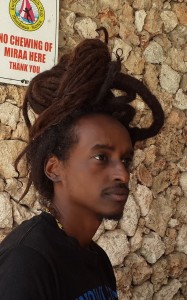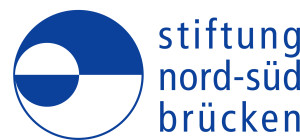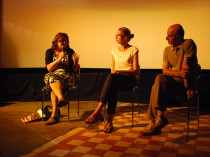“The Reality is Worse” – Film screening of “Darfur’s Skeleton”

The four guest discussing with moderator Carolin Bannorth: from left to right: Carolin Bannorth, Hervé Tcheumeleu, Sarah Reinke, Ahmad Hassan Arnau, Abbas Tharwat
The Darfur conflict – told by local people, based on their own lived experiences. This was the theme of the fourth evening in 14km’s Film and Discussion Series, which featured Sudanese director, Hisham Hajj Omar’s documentary: “Darfur’s Skeleton”. From the outset, the audience was closely listening to the realities of Darfur as our guest, Ahmad Hassan Arnaud, himself having fled from the region, explained: “In Darfur, a village is burned every one to two days. But the media do not report it.”
This 2009 film covers three dimensions of the war in Darfur: environmental destruction, persecution of the civilian population, and the role of tribal authorities in resolving the conflict.
At the time of filming, three trees a day were being cut down in Kondowa forest – a rate that could soon lead to desertification of the region. In 2009, the forest is as good as dead. Nearby, in Otash camp, the home for tens of thousands of people displaced from their homes, inhabitants struggle to survive through daily life with close to nothing. For these refugees, selling the rare forest wood represents a scarce livelihood opportunity they are obliged to take, despite the protests of forest rangers in the film. “We have no choice”, the displaced declare. The Kondowa forest symbolizes a vicious cycle, which fuels the war in Darfur: a poor climate and limited arable land drives resource conflicts between neighbouring tribes, and nomadic and sedentary populations. In turn, hostilities destroy villages and force people to flee, leading to further exploitation of national resources in areas where thousands of refugees gather – as in the Kondowa Forest.
Giving voice to the victims
The sight of countless victims fleeing violence, which pervades the news and media, offers only an abstract context and encrypted figures. This documentary, in contrast, highlights the names, faces and voices of the victims. Aysha, for example, was shot and robbed in an attack in Guz. She lay alone and helpless in the village with her daughter until relatives were eventually able to rescue her, only for her injured leg to be amputated in Otash refugee camp, condemning her to a life of idleness. Half-smiling, Aysha laments: “How are we going to find the strength to cry?” By contrast, teacher Mohamed Adam, remains positive. He himself had to flee from home, traveling a dangerous route before reaching Otash camp. Having endured the experience, he is determined to pass on his knowledge to the children in the camp, so that they may tread a new, better path.
In addition to allowing victims of the war to have their say, the film analyses the causes of the war, portraying the situation from their perspective. They speak of the responsibility of the central government in Khartoum, whose strategy of “divide and rule” and tactics using the Janjaweed militia has activated conflict lines and fuelled hostility between the Arab and African populations. Tribal leaders argue that with peace between the government and the rebels, conflicts between individual tribes would soon be reconciled. Yet, the government is hesitant to provide essential funding to tribes so that they might self-govern and achieve peace. Another obstacle to peace, particularly emphasised by political analysts, is the challenge of putting to trial war criminals and providing reparations to the victims – without which there can be neither peace nor an end to cycle of hatred.
Holding the perpetrators accountable
The absence of judicial process was addressed by Sarah Reinke of the Society for Threatened Peoples in an audience discussion following the film screening. Tribunals at the local level and permanent mechanisms for prosecution are needed. At the international level, prosecution was not successful either. The International Criminal Court failed to hold President Omar al-Bashir accountable although he was indicted for his involvement in genocide, crimes against humanity, and war crimes.
Ultimately, the international community’s attempts to resolve the conflict have not been helpful. According to Sarah Reinke, the Doha peace process was not supported by international powers, with Russia and China blocking the UN Security Council’s ability to act. Hervé Tcheumeleu, executive director of the Africa Media Centre, pointed to the economic interests of large defence manufacturing companies, and to countries including Russia, China and the UK. Similarly, the impotence of the African Union (AU) on the issue has been evident, with Tcheumeleu arguing that “many presidents in the AU support Al-Bashir, as they themselves are in the same position as he is.”
“A village is burned every one or two days”
Ahmad Hassan Arnaud, a young Sudanese man from Darfur who has been living in Berlin for three years, lived through the war himself. “The reality is still clearly worse than shown in the film,” he informed the audience. “A village is burned every one or two days. But the media do not report it.” Sarah Reinke agreed: “After twelve years of genocide, the situation is very grim.” It was difficult to take a positive outlook away from the discussion. But at least the film ended on an optimistic note with a hopeful phrase: Darfur has a strong skeleton – and so long as the skeleton remains intact, flesh will once again cling to it.
The director, who is currently working under the name of Hajooj Kuka, is receiving a lot of accolades and prizes, from Toronto to Luxor, for his second documentary “The Beats of Antonov.” This film, which explores the music scene of his home country, gives expression to something that is obscured by the palpable suffering in “Darfur’s Skeleton”: Against an identity that is imposed by the Government and which drives conflict, the only solution is to enthusiastically become aware of one’s own cultural identity. After the first film, we know that Darfur’s skeleton is not yet broken. After the second film, we will know that music can bring Darfur’s skeleton back to life.
We thank our guests Ahmad Hassan Arnaud, Sarah Reinke, Hervé Tcheumeleu and Abbas Tharwat for helping us approach the difficult topic by sharing their personal point of views.
Event organisation and moderation: Carolin Bannorth
Coordination of the Film and Discussion Series: Andreas Fricke
Text: Susanne Kappe
Translation: Alex Odlum
Photos: Silvia Limiñana, Caroline Bunge
Organisation: The volunteer 14km Film Team
The 14km Film and Discussion Series 2015 gets sponsorship by budgetary funds of the Federal State of Berlin – Office for Development Cooperation.
Further events are scheduled as followed:
07 October / 28 October / 18 November / 9 December
The events are dedicatet to a single country or specific topic, in order to give an artistic-documentary impression . The ensuing audience discussion aims to include further informations by an affected person living in Berlin and by an scientific expert, always aiming to make links to North-South relationships.
We express thanks for the support:








